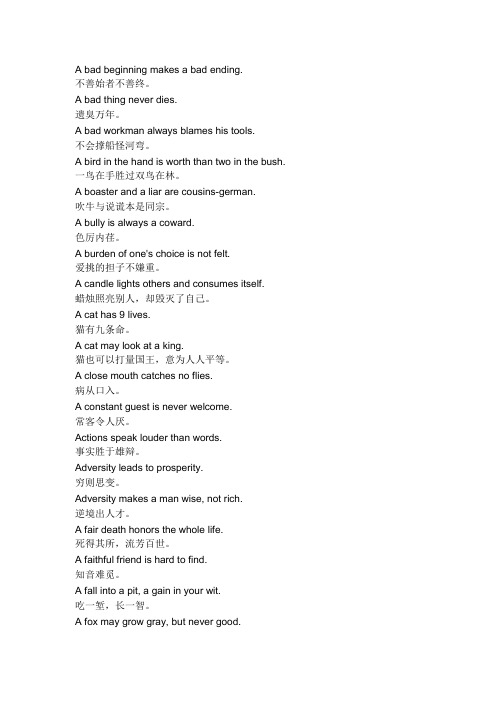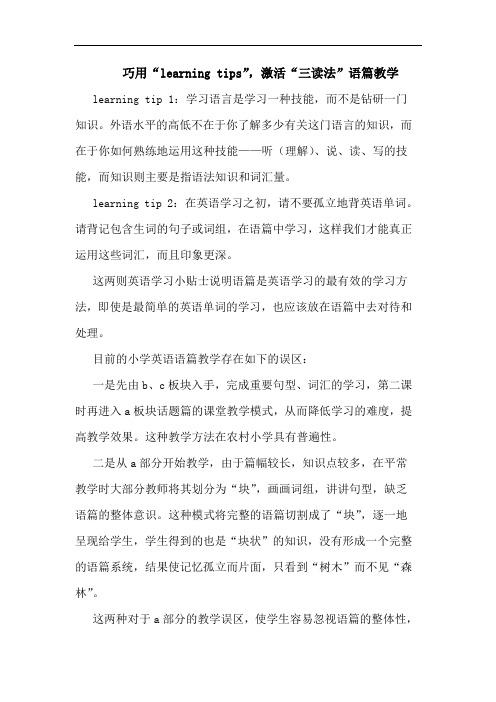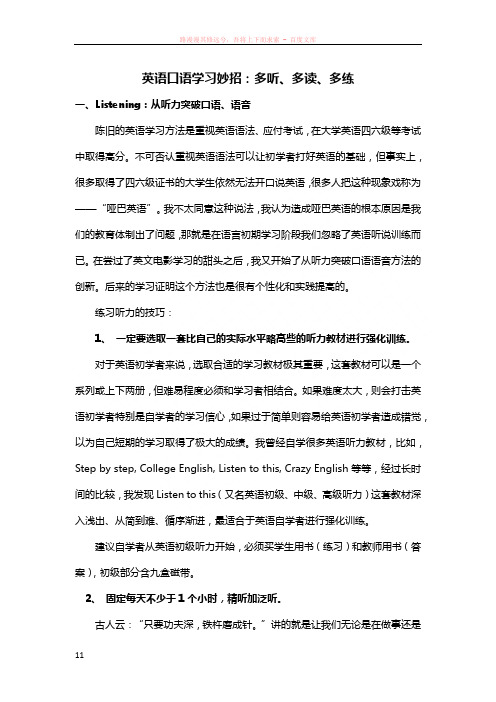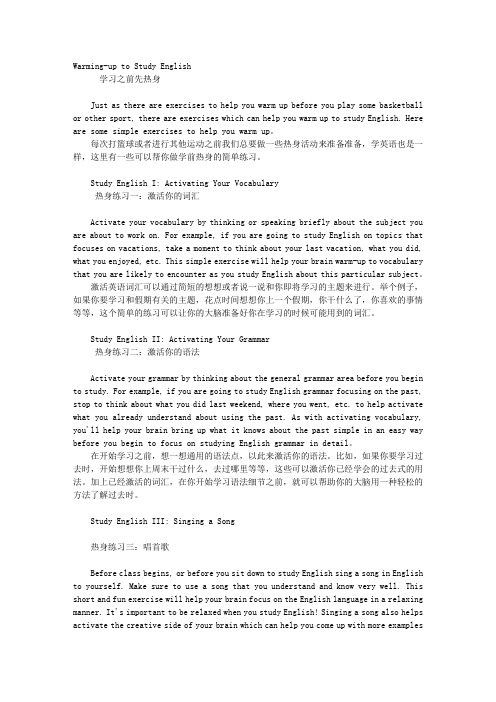学英语小贴士
- 格式:docx
- 大小:15.09 KB
- 文档页数:2

关于英语写健康小贴士的句子英文回答:1. Exercise regularly.Regular exercise is one of the best things you can dofor your overall health. It helps to improve your cardiovascular health, strengthen your muscles and bones, and reduce your risk of chronic diseases such as obesity, heart disease, and stroke. Aim for at least 30 minutes of moderate-intensity exercise most days of the week.2. Eat a healthy diet.Eating a healthy diet is essential for maintaining a healthy weight and reducing your risk of chronic diseases. Focus on eating plenty of fruits, vegetables, and whole grains. Limit your intake of processed foods, sugary drinks, and unhealthy fats.3. Get enough sleep.Sleep is essential for your physical and mental health. Most adults need around 7-8 hours of sleep per night. When you don't get enough sleep, it can lead to a number of problems, including fatigue, irritability, difficulty concentrating, and impaired judgment.4. Manage stress.Stress is a normal part of life, but too much stress can take a toll on your health. Find healthy ways to manage stress, such as exercise, yoga, meditation, or spending time with loved ones.5. Quit smoking.Smoking is one of the worst things you can do for your health. It increases your risk of heart disease, stroke, cancer, and other serious diseases. If you smoke, quit now.6. Limit alcohol intake.Excessive alcohol intake can damage your liver, heart, and other organs. Men should limit their alcohol intake to no more than two drinks per day, and women should limit their intake to no more than one drink per day.7. Get regular checkups.Regular checkups are important for catching health problems early when they're easier to treat. Talk to your doctor about how often you should get a checkup.8. Take care of your mental health.Mental health is just as important as physical health. If you're struggling with mental health issues, don't hesitate to seek help. There are many resources available to help you get the support you need.9. Be kind to yourself.Be kind to yourself both physically and mentally. Thismeans eating healthy, getting enough sleep, and exercising regularly. It also means taking time for yourself to do things you enjoy and spending time with people who make you happy.10. Live a healthy lifestyle.A healthy lifestyle is one that includes all of the above tips. By following these tips, you can improve your overall health and well-being and live a longer, healthier life.中文回答:1. 定期锻炼。

【导语】我们⼀直在不断的学习语法规则,为什么呢?因为语法知识是⽤英语交流的基础。
欢迎阅读为⼤家精⼼整理的快速掌握语法的12个⼩贴⼠!欢迎阅读学习!更多相关讯息请关注!1. Memorize 3 Fundamental Capitalization Rules记住三个基础的⼤写规则The first word in a sentence. You should always capitalize the first word in a sentence regardless of what type of word it is.⼤写句⼦⾥的⾸字母。
不管句⼦⾥的第⼀个单词属于什么类别,都要⼤写其⾸字母。
Proper nouns (names). These include the names of people, places, days and months, companies, etc. For example: Matthew, Helen, France, Tokyo, Mississippi, Saturday, January…专有名词⾸字母⼤写。
包括:⼈物的名字,地点,⽇期,⽉份,公司等。
例如:马修,海伦,法国,东京,密西西⽐州,星期六,⼀⽉等….Honorifics and titles, as well as their abbreviations. Mr., Mrs., Miss, Doctor (Dr.), President, Lord, etc.⼤写敬语及头衔的⾸字母。
例如:先⽣,夫⼈,⼩姐,医⽣,主席,公爵等。
2. I and Me Aren’t InterchangeableI和Me是不可互换的I and me are’t interchangeable. They are used in different grammatical constructions. I is a pronoun that serves as a subject of a sentence. For example, Matthew and I went for a walk, both I and Matthew are subjects of the sentence while went is the verb. Me is a pronoun that serves as an object of a sentence. Me is needed when someone else is performing the action.I和 Me是不可互换的,它们⽤于不同的语法结构。


巧用“learning tips”,激活“三读法”语篇教学learning tip 1:学习语言是学习一种技能,而不是钻研一门知识。
外语水平的高低不在于你了解多少有关这门语言的知识,而在于你如何熟练地运用这种技能——听(理解)、说、读、写的技能,而知识则主要是指语法知识和词汇量。
learning tip 2:在英语学习之初,请不要孤立地背英语单词。
请背记包含生词的句子或词组,在语篇中学习,这样我们才能真正运用这些词汇,而且印象更深。
这两则英语学习小贴士说明语篇是英语学习的最有效的学习方法,即使是最简单的英语单词的学习,也应该放在语篇中去对待和处理。
目前的小学英语语篇教学存在如下的误区:一是先由b、c板块入手,完成重要句型、词汇的学习,第二课时再进入a板块话题篇的课堂教学模式,从而降低学习的难度,提高教学效果。
这种教学方法在农村小学具有普遍性。
二是从a部分开始教学,由于篇幅较长,知识点较多,在平常教学时大部分教师将其划分为“块”,画画词组,讲讲句型,缺乏语篇的整体意识。
这种模式将完整的语篇切割成了“块”,逐一地呈现给学生,学生得到的也是“块状”的知识,没有形成一个完整的语篇系统,结果使记忆孤立而片面,只看到“树木”而不见“森林”。
这两种对于a部分的教学误区,使学生容易忽视语篇的整体性,将单词、句型、语法及语篇中蕴含的文化背景等进行人为的分割,使语篇教学目标不明确;忽视学生对语篇的理解,造成教材提供的课程资源不能被充分利用;忽视语言的基本知识与语言能力的训练,造成学生英语学习的两级分化;任务活动的有效性不足。
这样就造成语篇教学的效能低下,学生的语篇理解水平长期不能得到提高,阅读能力弱。
小学英语语篇教学的主要任务是:基于“任务型教学”的一般要求,以阅读语篇为基本形式,在培养和发展学生的英语阅读理解能力(获取信息、整理信息、处理信息、加工信息和利用信息的能力)和英语语篇阅读技巧的同时,“使在他们学习过程中发展综合语言运用能力,提高人文素养,增强实践能力,培养创新精神”。

英语口语学习妙招:多听、多读、多练一、Listening:从听力突破口语、语音陈旧的英语学习方法是重视英语语法、应付考试,在大学英语四六级等考试中取得高分。
不可否认重视英语语法可以让初学者打好英语的基础,但事实上,很多取得了四六级证书的大学生依然无法开口说英语,很多人把这种现象戏称为——“哑巴英语”。
我不太同意这种说法,我认为造成哑巴英语的根本原因是我们的教育体制出了问题,那就是在语言初期学习阶段我们忽略了英语听说训练而已。
在尝过了英文电影学习的甜头之后,我又开始了从听力突破口语语音方法的创新。
后来的学习证明这个方法也是很有个性化和实践提高的。
练习听力的技巧:1、一定要选取一套比自己的实际水平略高些的听力教材进行强化训练。
对于英语初学者来说,选取合适的学习教材极其重要,这套教材可以是一个系列或上下两册,但难易程度必须和学习者相结合。
如果难度太大,则会打击英语初学者特别是自学者的学习信心,如果过于简单则容易给英语初学者造成错觉,以为自己短期的学习取得了极大的成绩。
我曾经自学很多英语听力教材,比如,Step by step, College English, Listen to this, Crazy English等等,经过长时间的比较,我发现Listen to this(又名英语初级、中级、高级听力)这套教材深入浅出、从简到难、循序渐进,最适合于英语自学者进行强化训练。
建议自学者从英语初级听力开始,必须买学生用书(练习)和教师用书(答案),初级部分含九盒磁带。
2、固定每天不少于1个小时,精听加泛听。
古人云:“只要功夫深,铁杵磨成针。
”讲的就是让我们无论是在做事还是学习的时候都得把功夫做到位,否则一事无成。
对于英语初学者来说,最简单的是一切可以从头再来,但最难的莫过于坚持二字。
所谓精听就是根据学习的进度每天固定听一个小单元,尽最大努力把句子和文章的意思都听懂。
泛听是指随时随地用外放的录音机听一些英文歌曲、英文电影对白或英语新闻等,实际上是给初学者自己制造一定的英语学习环境。

Warming-up to Study English学习之前先热身Just as there are exercises to help you warm up before you play some basketball or other sport, there are exercises which can help you warm up to study English. Here are some simple exercises to help you warm up。
每次打篮球或者进行其他运动之前我们总要做一些热身活动来准备准备,学英语也是一样,这里有一些可以帮你做学前热身的简单练习。
Study English I: Activating Your Vocabulary热身练习一:激活你的词汇Activate your vocabulary by thinking or speaking briefly about the subject you are about to work on. For example, if you are going to study English on topics that focuses on vacations, take a moment to think about your last vacation, what you did, what you enjoyed, etc. This simple exercise will help your brain warm-up to vocabulary that you are likely to encounter as you study English about this particular subject。
激活英语词汇可以通过简短的想想或者说一说和你即将学习的主题来进行。
英语学习小贴士:就划线部分提问一、对`物`划线用What.二、对人,名字划线并不都用Who,如果句中含有name这个词时用What。
三、对“地点”划线用Where,如果“地点”作定语时,用Which后跟被修饰的那个名词。
四、对“加、减、乘、除”的得数划线用What.五、对“年龄”划线用How old.六、对“身体状况”划线用How.七、对“学校、年级、班、排、组、号”的数词划线,用What ,这些名词要紧跟What 之后八、对“颜色”划线,用What colour,如果颜色作定语,What colour后要跟被修饰的名词。
九、对名词所有格,名词性物主代词划线用Whose ,如果作定语,Whose 后要跟被修饰的名词。
十、对“时间”划线用What time/When。
十一、对“可数名词的数量”划线用How many +复数名词。
十二、对“重量、价钱”划线用How much。
十三、对“程度”划线用How 。
十四、对“人或物出的毛病”划线用What 's wrong with。
?十五、对“职业”划线用What。
十六、对“星期几”划线用What day。
十七、对“there are”句型中的主语划线用What。
十八、对“不可数名词的数量”划线用How much+不可数名词。
对划线部分提问答案:1.This is an orange.What is this?2.①We can see a cat under the desk. What can you see under the desk?②We can see a cat under the desk. Where can you see a cat?3. He is under the tree.Where is he?4.The shop near the school sells things like that.Which shop sells things like that?①He saw a book on the desk.Where did he see a book?②The man in the car is Tom’s father. Which man is Tom’s father?5.①Jim Greem is not here.Who is not here?②Tom helps me with my English.Who/Whom does Tom help with English?6.The girl's name is Ann.What is the girl’s name?7.Six and four is ten.What is six and four?8.They are in Class One.What class are they in?9.Jim's bus is Number Twenty-nine.What number is Jim's bus?10.Her sweater is red.What colour is her sweater?11.①This is my skirt.Whose skirt is this?②This skirt is mine.Whose is this skirt?12.We go to school at seven in the morning. What time do you go to school inthe morning?13.It's Sunday today.What day is it today?14.My bike is broken.What 's wrong with your bike?15.It’s a Volvo.What make is it?16.Today is 28 July.What date is today?17.She has one red coat.How many red coats does she have?18.The bag of rice is 90 kilos.How much is the bag of rice?19.It costs me 3 dollars.How much dose it cost?20.①There are two books on the desk.What's on the desk?②There are two books on the desk.How many books are there on the desk?21.Han Meimei likes bananas very much.How does Han Meimei like bananas?22. He is fine.How is he?23. Miss Li is twenty-three.How old is Miss Li?24.He goes to school on foot.How does he go to school?25. He has worked in this school for five years. How long has he worked in this school?26. I read English every day.How often do you read English?27.It’s two hundred and five kilometers.How far is it?28.It was sunny yesterday.What was_the weather like yesterday?29.My father made a kite last spring.What did your father make last spring?30.John has lunch at school every day.What does John do at school every day?31.①My brother was reading a book under a tree last morning. Who was reading a book under a tree lastmorning?②My brother was reading a book under a tree last morning. What was your brother doing under a tree lastmorning?③My brother was reading a book under a tree last morning.Where was your brother reading a book lastmorning?④My brother was readin g a book under a tree last morning. When was your brother reading a book under atree?32.He was late because of the traffic jam.Why was he late?。
一、基本语汇篇谢谢!——Thank you.多谢!--Thanks a lot.对不起,麻烦你。
——Excuse me..需要帮忙吗?--Can I help you.谢谢你的帮助。
——Thank you for helping me.无论如何,我还要感谢你。
——Thanks, anyway.您好。
--How are you!初次见面问好。
——How do you do!很高兴见到你。
——(It's) nice to meet you.请问您从哪来。
--Where are you from?请问贵姓。
--Can I have your name?我叫...。
——My name is ... (I'm ...)很高兴认识你。
——It was a pleasure to meet you.很高兴见到你。
——Pleased to meet you.希望再见到你。
——Hope to see you again.玩得快乐--Have a good time.祝你好运。
——Good luck.我希望没事。
——I hope nothing is wrong.怎么了?——What's the matter?糟糕,严重吗?——Oh, no! Is it serious?我真为你难过。
——I'm sorry for you.一路平安,走好。
——Have a safe trip home.二、问路篇1、方向East 东South 南West 西North 北Left 左Right 右Straight on 往前直去There 那儿Front 前方Back 后方Side 侧旁Before 之前After 之后First left/right 第一个转左/右的路2、请问如何前往...Excuse me, How do I get to the ....... ? 请问如何前往¨¨¨?How do I get to the airport? 请问如何前往机场?How do I get to the bus station? 请问如何前往公车站?How do I get to the metro station?请问如何前往地下铁路站?(Metro 乃欧洲常用字)How do I get to the subway station? 请问如何前往地下铁路站?(Subway 乃北美洲常用字)How do I get to the underground station? 请问如何前往地下铁路站?(underground 乃英国常用字)How do I get to the train station? 请问如何前往火车站?How do I get to the hotel XXX? 请问如何前往XXX 酒店?How do I get to the police station? 请问如何前往警局?How do I get to the tourist information office? 请问如何前往旅游资讯局?3、请问附近...Excuse me, Is there ....... near by? 请问附近有没有...?Is there a baker near by? 请问附近有没有面包店?Is there a bank near by? 请问附近有没有银行?Is there a bar near by? 请问附近有没有酒吧?Is there a bus stop near by? 请问附近有没有公车站?Is there a cafe near by? 请问附近有没有咖啡店?Is there a change bureau near by? 请问附近有没有找换店Is there a chemist's near by? 请问附近有没有药剂师?Is there a department store near by? 请问附近有没有百货公司Is there a disco near by? 请问附近有没有的士高?Is there a hospital nearby? 请问附近有没有医院??Is there a post box near by? 请问附近有没有邮政局?Is there a public toilet near by? 请问附近有没有公共厕所?Is there a restaurant near by? 请问附近有没有餐厅?Is there a travel agent near by? 请问附近有没有旅游社?三、住宿篇我會晚一点到达,请保留所预订的房间。
英语饮食小贴士写法作文Title: Tips for Healthy Eating: A Guide to Better Nutrition。
Eating healthily is essential for maintaining overall well-being and vitality. Whether you're aiming to lose weight, improve your energy levels, or simply feel better, making informed choices about what you eat is key. Here are some practical tips to help you on your journey to better nutrition:1. Focus on Whole Foods: Incorporate plenty of whole, unprocessed foods into your diet. These include fruits, vegetables, whole grains, lean proteins, and healthy fats. Whole foods are rich in nutrients and fiber, which arevital for good health.2. Portion Control: Be mindful of portion sizes to avoid overeating. Use smaller plates and bowls, and pay attention to your body's hunger and fullness cues. Eatingslowly and savoring each bite can also help prevent overindulgence.3. Eat a Variety of Foods: Aim for a diverse range of foods to ensure you're getting a wide array of nutrients. Include foods from all food groups, and don't be afraid to try new things. Eating a variety of foods also makes meals more enjoyable and satisfying.4. Limit Added Sugars and Processed Foods: Minimize your intake of foods and beverages high in added sugars, such as sugary drinks, candies, and sweets. Opt for whole fruits instead of fruit juices, and choose minimally processed snacks like nuts and seeds.5. Stay Hydrated: Drink plenty of water throughout the day to stay hydrated. Water is essential for numerous bodily functions, including digestion, circulation, and temperature regulation. Aim to drink at least 8 glasses of water per day, and more if you're physically active or in hot weather.6. Plan and Prepare Meals Ahead of Time: Take the time to plan your meals and snacks for the week ahead. This can help you make healthier choices and avoid impulsive eating. Prepare meals in advance, such as chopping vegetables or cooking grains, to save time during busy weekdays.7. Read Food Labels: Pay attention to food labels when shopping for groceries. Look for products with simple, recognizable ingredients and avoid those with long lists of additives and preservatives. Be wary of marketing claims like "low-fat" or "reduced-sugar," as these products may still be high in unhealthy ingredients.8. Listen to Your Body: Tune in to your body's hunger and fullness signals, and eat when you're hungry rather than out of habit or boredom. Eat slowly and mindfully, paying attention to the taste, texture, and aroma of your food. Stop eating when you feel satisfied, rather than overly full.9. Practice Moderation, Not Deprivation: Allow yourself to enjoy your favorite foods in moderation, without guiltor restriction. Depriving yourself of certain foods can lead to cravings and overeating in the long run. Instead, focus on balance and moderation, and savor treats occasionally.10. Seek Support and Accountability: Surround yourself with supportive friends, family members, or a community who share your goals for healthy eating. Consider enlisting the help of a nutritionist or joining a support group to stay motivated and accountable.By incorporating these tips into your daily routine, you can make meaningful strides towards improving your nutrition and overall health. Remember that small changes add up over time, so be patient with yourself and celebrate your progress along the way. Here's to a happier, healthier you!。
学英语小贴士
“如何才能学好英语呢?”这是很多同学经常提出的问题。
其实, 学好英语的关键是要培养自己的学习兴趣, 而良好的学习方法是保持高涨的学习兴趣的“润滑剂”。
下面向同学们介绍一些在平时的英语学习中简便、易学的方法, 坚持下去, 你定会有所收获。
一、不让单词成为英语学习的障碍
同学们普遍认为记忆英语单词很枯燥,没有兴趣, 因此, 词汇量小成为阻碍同学们前进的绊脚石。
究其原因, 主要是很多同学平时只知“死记硬背”, 所以记得快, 忘得也快。
其实, 记忆单词的科学方法, 是把读音、拼写和用法融为一体, 并把单词应用到句子里面去理解。
同学们在记忆单词时, 应尽可能地让自己兴奋起来, 并把眼、口、手、脑都调动起来。
在记忆单词的同时要大声朗读, 通过反复刺激发音器官和听觉器官, 把单词的读音铭刻在脑子里。
这样既可以提高听力水平, 又可以改进自己的口语发音, 还记忆了单词。
低着头拼命默写并不是记忆单词的好办法, 因为默写只训练了眼和手, 对培养和提高听、说能力没有帮助。
孤立地机械记忆单词也是不可取的。
要真正理解每个单词的意思, 离不开单词所在的句子, 因为句子中既包含了发音规则, 又有语法内容, 还能表明单词在具体语言环境中的特定含意。
把单词放到句子中去理解, 把一些精彩的句子记下来, 养成背诵句子的好习惯, 这样,记住了句子, 单词也就不容易忘了。
有一定英语基础的同学还可以通过阅读英语课外读物、听英语歌等方式, 记忆一些新单词。
这些方式更有助于你记得快, 记得牢。
二、听不懂也要听
许多同学常常抱怨练习听力时听不懂, 因而丧失了听的兴趣, 往往半途而废。
殊不知,“听不懂”也是在进步,只不过你自己觉察不到而已。
虽然你暂时听不懂, 但你的耳膜已经开始尝试着适应一种新的语言发音系统, 你的大脑在调整“频率”, 准备接受一种新的信息代码, 这本身就是一次飞跃。
所以切记: 即使听不懂时, 你也在进步。
练习听力, 要充分利用心理学上的“无意注意”, 即,一有时间, 就打开录音机放英语磁带, 为自己营造英语的语言环境, 这时, 你不用有意去听, 只要你的周围是英语的语言环境, 你的听力水平就会在不知不觉中提高。
这是真的吗? 举一个简单的例子: 同学们可能会有这样的经历, 如果你的周围环境中正在播放某一首你很陌生的歌曲, 开始时你对它印象不深, 但通过反复播放, 即使你不用心去听, 也会发现自己在不知不觉中记住了歌曲的旋律、歌词, 甚至会哼唱。
这就是环境的作用。
当然, 这一作用的显现需要时间的积累, 不过, 只要坚持下去, 一定会有收获。
三、利用网上资源,培养兴趣
如果同学们把学习英语当成是一种任务,那么很难学好英语,过程中也会觉得枯燥辛苦,其实这样学习英语效率是很低的。
那么我们怎么从中挖掘我们的兴趣呢,现在互联网急速发展,网络上的资源也越来越多,同学们可以通过这些资源来陪养自己学英语的兴趣,把学习英语变得更加的有趣。
相信很多同学都上过普特英语、可可英语、三条杠网、大耳朵英语这些学习英语的网站了,其实这些网站上面有非常多的资源可以帮助大家学习英语,比如说练习听力和口语的一些小游戏、小软件,或者通过和社区里的其他学员沟通,还可以关注自己感兴趣的标签,这些小方法都可以让学习英语变得不那么枯燥。
甚至有一些同学是因为喜欢美剧和英文歌萌发了学习英语的兴趣,最后通过网络自学或者网校学习使得自己的英语水平大大提升,这些都是同学们很好的借鉴。
要巧妙运用网络平台上的工具来使得自己的学习方法和方式更加有效。
四、要持之以恒
这虽不是一个严格意义上的学习方法, 但有相当一部分同学正是因为缺乏持之以恒的精神, 才在英语学习中出现了问题。
英语学习的成功是长期积累的结果, 但它不是一个持续提高的过程, 而是由一系列的突然提高以及两次提高之间似乎没有变化的阶段组成的, 这就是所谓的“高原效应”。
有时候, 在几个月的学习中, 你都可能发现不了自己英语水平的提高, 这时,有的同学容易灰心丧气, 失去学习的动力。
避免“高原效应”的好办法是, 发挥班集体的凝聚作用以及同学之间互相鼓励和支持。
你也可以向老师请教, 找到近一段时间内自己在英语学习上的收获和不足, 为进一步提高打下基础, 增强学习动力。